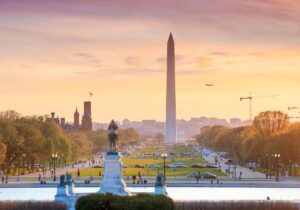On October 4, a plainclothes Hong Kong policeman shot a 14-year-old protestor. He became the second demonstrator to meet live police fire that week.
The Hong Kong protests began in June after the government proposed allowing extradition to Mainland China. Four months later, more than 2,000 people have been injured.
“We believe this is the last stand for our future and freedom,” a 22-year-old protestor told Business Insider in August. “We’d rather die in the fight than slowly suffocate to death after we lose the fight.”
This is a desperate effort to protect democracy and the civil rights the Chinese Communist Party (CCP) is rapidly stripping from Hong Kong—a last-ditch fight for the ideological imperatives that undergird the American system, at home and abroad.
Today, China tightens the screws on Hong Kong so that the citizens cannot make their own decisions, and the US says nothing. China undermines the dignity of its own people and the US ignores it. China uses commercial leverage to silence the special genius of the individual within America, and the US nods.
THE THREAT AT HOME
The day the 14-year-old protestor was shot, Houston Rockets general manager Daryl Morey tweeted support for the cause: “Fight for Freedom, Stand with Hong Kong.” A representative of one of the most American of American institutions, he was supporting American ideals.
The Chinese consulate in Houston voiced outrage. Rockets owner Tilman Fertitta rejected Morey’s comments; Morey deleted the tweet and apologized. The Chinese Basketball Association cut off cooperation with the Rockets. China’s television station stopped showing preseason games, and Shanghai canceled a series of NBA Cares events.
The NBA published a conciliatory, apologetic statement in Chinese: “Extremely disappointed,” NBA leadership labeled the tweet “inappropriate.” The Chinese press surmised Morey would be fired. More restrained, the NBA’s English-language statement called the incident “regrettable” and expressed hope the NBA might “be used as a unifying force to bridge cultural divides.”
The problem is not that Beijing is culturally different. The problem, and the truth, is that the CCP is a brutal, authoritarian regime. Hong Kong’s desperation tells some of that story. If you want its baldest manifestation, look at the Uighur internment camps in Xinjiang, where Beijing systematically exterminates a minority population.
The NBA affair is not singular. It is simply the latest example of the self-censorship that Beijing encourages abroad. For decades, Beijing has manipulated American commercial and financial interests to establish influence in powerful ecosystems: Hollywood, Wall Street, universities, critical political districts. Bought by Chinese money, America’s most powerful institutions become mouthpieces of the Chinese party line.
Once, the US believed economic interdependence would liberalize China. Even the most optimistic are beginning to accept the folly of that idea.
THE STAKES FOR THE WORLD
Geopolitically, Beijing is a grand strategic challenger to the United States. It intends to overtake American hegemony and proliferate its norms and ideology internationally. For the first time since the Cold War, the US faces near-peer competition, waged in every segment of society.
Beijing represents a moral challenge for Washington. The contest is not simply one of national prestige or economic might. It is about narratives and visions for the future. If Beijing shapes global networks and sets global standards, the authoritarian rulebook will not just apply to foreign affairs, but movies, social media, and sports.
If this seems overwrought, look at the social credit system in China. Look at how it is being used to exterminate Uighurs. If it seems like those tactics will remain within China’s—and Hong Kong’s—borders, talk to a Hollywood writer who has had his language censored or a Western researcher who has had his technology stolen by the Chinese. Think about China rejecting international law in the South China Sea, or its building an empire in Africa. Think of its supporting despots in North Korea, Iran, Russia, and Zimbabwe.
A CALL TO ARMS
The great power contest is coming to a head. The US needs to act as a moral leader.
In the Cold War, President Ronald Reagan was clear about the competition underway, and he was clear about its moral stakes and the US stance toward them. He spoke with conviction about the fundamental freedoms enjoyed within and beyond US borders, freedoms that undergird economic growth, peace, and human achievement. He relayed that message to Communists in Beijing as well as in Moscow.
On a trip to China in 1984, President Reagan said America believes “in the dignity of each man, woman, and child. Our entire system is founded on an appreciation of the special genius of each individual, and of his special right to make his own decisions and lead his own life.”
Positive steps taken over the past few months suggest there is hope. China fears a “technology blockade.” Recent blacklisting of firms tied to the Xinjiang surveillance state played on that fear in defense of moral virtue. Such measures need to be expanded strategically across the American system: leaders in every walk of life should recognize that they are actors—and targets—in this struggle.
China’s strategy takes advantage of American tendencies. We are an open, trusting, optimistic society. Beijing uses our fragmentation as a means to infiltrate us, our openness as a means to manipulate.
But we have a critical strength that can save us in this fight—and that China underestimates. President Reagan was fond of recalling Pope Pius the XII’s admiration of the United States: “the American people have a genius for splendid and unselfish action.” That is the genius we need today.






 Sponsor a student for Christianity & National Security 2024
Sponsor a student for Christianity & National Security 2024